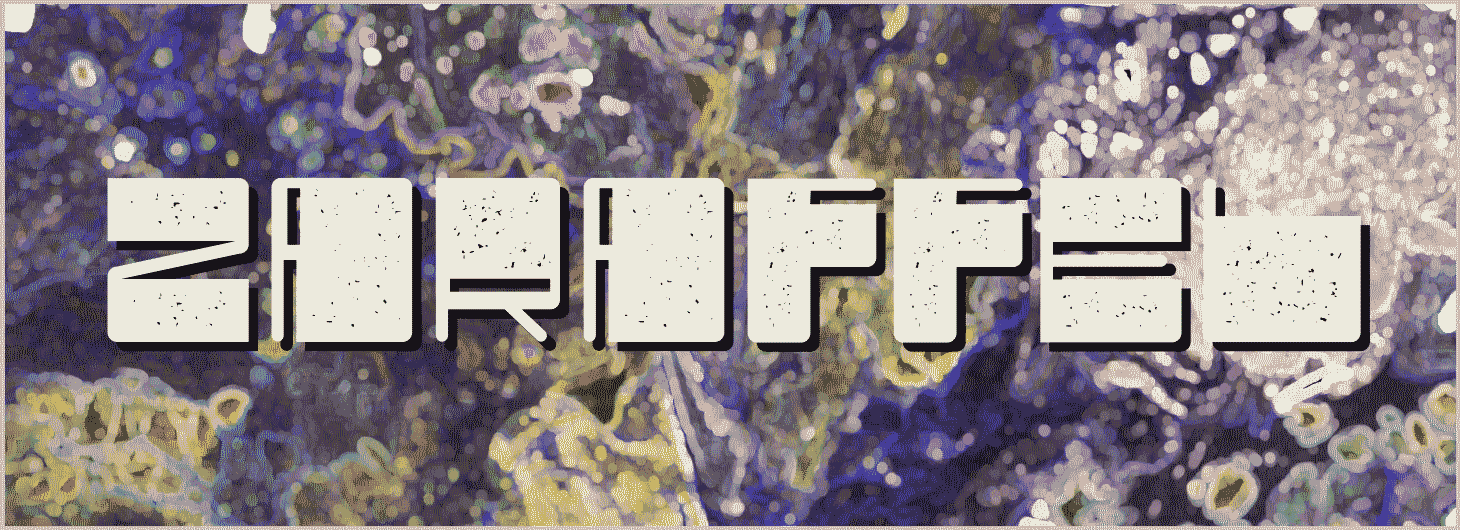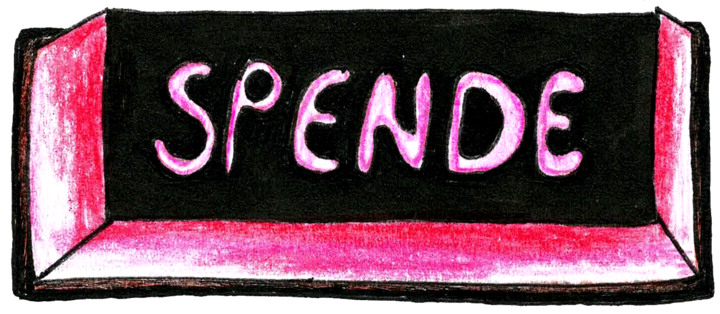
You will have asked yourself what this means, and we will have answered: you just needed to listen to your own inner voice. A thousand questions - give or take a few - run through your mind. You rarely keep track. Rarer still might one of these questions truly concern you. The whole bloody rest has gently been buried, your doubts lying numb beneath a frayed rug of sedative entertainment, swept between piles of dust, as if nothing was really happening. That’s how life is, we tell ourselves, hoping all too much that we just might believe it. We stray as we wander. Once the ominous doubts became too many, something within us began to stir. In due time emerged a movement, directionless at first: Zaraffel. The printed volume that now rests in your hands will have been the embodiment of our vision.
Will it have been worth the effort? To comprehend the work of another; to understand, even with the greatest possible effort, those who reach out to us; understanding what concerns them, what moves them, what they stand for - that is what feels truthful for Zaraffel. Our vision is thus a vision of correspondence, and those who share it deserve their share in Zaraffel. Will it have been meaningful? Without a doubt. It will, in fact, have been nothing but meaning.
These days it seems that anything can be accomplished without the slightest effort, and if not, it is for sale. Whether charisma, character, or creativity, it doesn’t matter; knowledge has collapsed into mere information, and, as such, become a commodity. Honest endeavour and labour seem superseded. Hedonistic optimism buys its way out of pain, all the while believing that any future is possible if it can only be cashed-in on. The future, however, will not be a coupon.
It takes time, labour and ambition - in a word, commitment - to achieve satisfactory results. Both what is behind the event as well as what precedes it, is more than meets the eye. The once compelling game, a one-sided humour, became serious: just because new answers were found to old questions does not mean they are less threadbare. Even that which is new must be criticized; this is necessary, in fact, lest such shapeless categories as “good” and “evil” be again allowed to sharpen their edges. We no longer recognise anyone who can judge these matters once and for all. Solely in continuous correspondence lies a chance to mediate between the aporia of life.
God went out for a pack of cigarettes and never came back. His departure, even if mockingly welcomed by naïve loons and dubious minds, was anything but probationary. Nietzsche missed God dreadfully, more so than many who came after him. Compensating for that loss became, subsequently, the preeminent goal. Development and progress, once made possible by the grace of God, were to replace their former patron. A design fault. What was left over, then? Nothing but progress for progress’ sake; the goal of merely having a goal. Today the significance of this endeavour remains as empty as the sign from which it first emerged. As so much is swept under the rug, the inner processes of this obsessively pursued development have been unfairly neglected. Alas, this insight we owe to the same illusion of demise.
Philosophers used to write “causa causae est causa effectus,“ whereby they meant that even our failure would not have been without reason. We do not want to take our chances, and so we choose to act immediately. Why, you ask? Because Zaraffel cannot wait in lethargic eternity, in the comfort of the constructed, plastic worlds of the digital. We have to act, because others do not. We sense a weight upon our shoulders, upon our arms and legs. Our generation’s shoulders carry generations’ worth of burdens, some already redeemed, others not.
Most of it is not your problem, but feel free to stay here, leave your baggage where it stands, and miss your flight together with us and allow something in this cabinet of curiosities to catch your eye. In the meantime, let us explain why it is that we want to feel responsible. This responsibility, which for us has arisen out of necessity, is one we want to assume together.
With God died not only the entitlement of morality but also the “perfect motto”; moreover, truth itself became suspicious. To care about one’s own wellbeing is intellectually often necessary; morally, it is indifferent. Community, however, emerges only when we become concerned for the very being of the Other. Zaraffel will have offered comfort (παραμύθι) to those who understood compassion as the sole driving force of moral action.
Compassion. Or, to put it in more modern language: Empathy. Like all words, it transmits only the message its receiver is able to discern. Empathy, when expressed directly and without mediation, feels often artificial because it itself feels nothing anymore; the very same language once believed to be unambiguous has long since been transvalued into its ironically distorted opposite. Self-identification, compassion’s natural opposite, thus has to be sought in the mediate rather than the immediate - in text, where, lonelier than immediate communication, mediate communication ploughs its own furrow.
Whereas both conventional language as well as computer-mediated communication have been corrupted into the commercial traffic of utterly trivial information, the poeticised word makes known the need to cultivate these fields anew. To tolerate ambiguity is the undeniable antipole to the obsessive specification of meaning in our history that, minute by minute, becomes ever more complex. The purpose we strive for does not just fall out of its letters but requires that its meaning be felt over and over again, up to the very limits of its half-life period. We are not so naïve as to believe this is a conventional problem that could be solved technologically.
Zaraffel’s responsive character serves its ambiguous diversity. In a renewed literature that follows this vision, the intertwinement of its form and function must be attested to by tracing their historical development. Wherever the distance between reading and writing can be overcome, we come together, we improvise, and we play.
According to this definition, even this printed volume escapes the desert of arbitrariness, as it cannot rest in arbitrary hands. It speaks to you only, and yet to everyone that reads it; to everyone who wishes to learn to understand it. Zaraffel will have thus devoted itself to its ambiguous purpose.
Zaraffel does not have monetary motives, yet we have no gift to give. We offer nothing that retraces those empty symbols to which we are exposed daily. Printing costs plus alms (ἐλεημοσύνη) are the signs of this single policy to which we, qua product, subscribe to. Those who have little shall be allowed to take; and those who wish to give, may give. This is the hope of what is to come, translated into the logic of commodities. We will not try to sell you the illusion we could conjure up our printing costs ourselves.
Not for this reason alone will Zaraffel be accused of opportunism. Indebted to the privileged burden of our freedom, we greet this kind of criticism with heartfelt smiles. We act heterogeneously, spinning our threads across diverse backgrounds, interweaving different topics in and throughout different texts and genres. Unpublished material only. In doing so, the multiplicity of our influences will be reflected from the surface of our diverse experiences, sketching at the same time the heart of their coordinates, whose depth we wish to gauge gradually, considerately, lentement. To explore our common coordinates will have been our goal, the realisation of which we entrust to the help of many who think alike, differently, and/or beyond.
Again: What happens right here seems necessary to us; we seek, find, have everything and nothing. We do not want to affiliate ourselves to a particular political tendency, nor to a particular minority discourse; at the same time, we cannot deny our historical contingency. To be privileged means being in the position to ignore a problem. At all times, we will prefer the „Both/And” to the “Either/Or”. Zaraffel is not a vector, an arrow that, once fired off, never strays from its course. Zaraffel is to hop off at a beautiful station, to listen, to understand a nuance. It is both the destination and waystation of its world. Zaraffel will have described itself as radically preposterous.
~
Mirona C.,
Stella Chachali,
Chen-Rui,
Georgios Dagkakis,
Erik Eising,
Tim Redfern,
...




